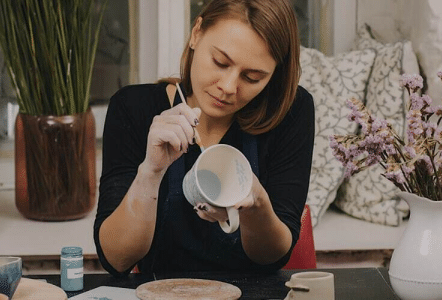With the shift in opinions towards cosmetics moving to a more natural, and simple approach, starting an at home cosmetic business is certainly a viable business option.
Whether you make products for the face, hair or nails, it’s important you have a great policy in place to protect your business.
Why start a cosmetics business?
There are many reasons why you should start a cosmetic business. For those who are passionate about makeup and skincare, it is a great opportunity to bring your own visions and ideas to life. It’s also a great outlet for your individual artistic expression.
Owning a cosmetic business can be a route for financial freedom, allowing you to work from home, have a flexible schedule and dedicate your time and money into growing something you really believe in.
Is a cosmetics business profitable?
Yes, cosmetic businesses can be extremely profitable, especially with the right planning and hard work. The cosmetic and skincare market is huge in the UK, which is why there will always be a demand for new and innovative products.
Types of cosmetics businesses
Whilst there are various different types of cosmetic businesses, in general there are two main types: beauty and skincare.
Beauty products generally include makeup items such as foundation, eyeshadow, lip balm and nail treatments and polishes. Skincare includes things such as serums, moisturisers, exfoliators, body lotions and eye creams.
How to start your own cosmetics business
Listed below are our top ways to promote your craft business this Christmas:
Define your place in the market
The cosmetic business is heavily saturated, so finding your unique place is very important. Start by asking yourself what sort of products you wish to sell, as well as what sort of values you wish to represent.
For example, are there a niche group of consumers who have trouble finding cosmetic products that work for them? Are there any up-and-coming trends that haven’t properly been delved into by other brands? Answering these types of questions will give you valuable insights into where your brand will fit in the market.
Using social media
Using social media is a great way to get your brand out there beyond a local scale. Of course it is important to attract a local audience for craft fairs, but having a wider audience is important as it encourages more online sales and you won’t have to rely solely on fairs.
Look at using a variety of different platforms such as Instagram, Facebook, Twitter and TikTok to show off your products. You can also use these sites to have flash discount codes or special deals to encourage shoppers to buy before they miss out.
Look at your competition
As we’ve mentioned, there will be a lot of competition since the cosmetic market is a busy one. However, don’t let this discourage you. You can learn how to do things better than your competitors by studying the market and reviewing what competitors are already selling.
Start by making two lists. One for what current brands are doing well, and one for where there are gaps in the market. This will help you to establish what sort of products you should be selling.
Create a marketing plan
Your brand may not do as well as it should if you don’t have a marketing plan to support it. You should be setting up social media accounts to spread awareness of your brand, and utilise paid advertising to help push your brand in front of those who are searching for similar items to what you sell.
If you have the budget, you may also be able to use smaller influencers to your advantage. They will help to promote your products and share them with a greater audience.
Adjust your plan as you need to
No plan is perfect, which is why you shouldn’t be scared to adjust your plan as and when you need to. Take the time to reflect and troubleshoot your brand and marketing plans. This will help you to establish what is and isn’t working, and allow you to slowly and effectively build your brand.
How much does it cost to start a cosmetic business?
The costs of starting a cosmetic business can vary depending on what type of business you plan on making. There are a variety of different costs that go into starting a cosmetic business, from your ingredients, to materials to packaging and marketing budgets.
As a general rule of thumb, start small and test the market first before you invest a huge amount of money in your product line. You can then establish where to start investing your money and start budgeting for the future.
What equipment do you need for a cosmetic business?
Again, this will vary depending on the type of cosmetics you plan on making, but generally speaking, you will need:
- Packaging
- Moulds
- Mixing bowls
- Specialist equipment such as blenders and boilers
- Small tools like tweezers and scalpels
- Oils and colourants
How do you market a cosmetic brand?
There are a few different ways you can market your cosmetic brand. As we’ve mentioned, using social media platforms is an extremely effective tool, especially for building a community. Creating a community is one way to grow your brand and increase customer loyalty. You can do this by hosting regular Q&A sessions through Instagram stories, creating fun and engaging content and utilising other tools, such as email marketing.
Once you have built this community, you can then start using it to your advantage. This includes utilising reviews and sharing user-generated content. Content that is authentic, rather than staged, is a great way to build trust among customers.
The legal side of selling cosmetics
Whilst you may not legally need insurance to sell certain crafts, you are legally required to have some form of protection in place when you sell homemade cosmetics. This is because there is a higher chance of customers suffering from things such as allergic reactions or rashes.
For this reason, we would highly recommend having insurance in place should an issue involving yourself or the public occur.
All cosmetics that are available to customers must have a “responsible person” who makes sure safety measures are followed and legal obligations are met. A responsible person can either be:
- Yourself as the manufacturer
- The distributor
- The appointed company owner or director
How to protect your cosmetic business
Our cosmetics product insurance policy is tailored to suit all makeup and skincare related businesses, with emphasis on maintaining customer safety when using handmade products.
The two main types of insurance that you will need include Public Liability Insurance and Product Liability Insurance. You will also need to insure your business to sell at a craft fair.
Public Liability Insurance covers both you and your business from compensation costs due to injury to the public as a result of your products or business operations. These expenses can be significant and could exceed what most small businesses could afford, should they not have insurance.
The main risks that are covered by this type of insurance include: death and disablement of the public and loss of or damage to, third party property.
Product Liability Insurance will cover your products in production, supply and sale. If any issues arise as a direct result of your products, processes and/or packaging, you will be covered should any unwanted costs, legal or personal, occur.
Where to sell handmade cosmetics products
There are many online sites which will allow you to sell your homemade cosmetic products, which are all incredibly simple to use. Some examples include:
- Etsy
- Folksy
- Facebook marketplace
- Depop
- eBay
- Society6
Be careful when using some sites. Many of them take a small percentage of your sales or even charge a listing fee which may not be the best idea when you’re just starting out.
If you wish to sell your products in person, you could go to local arts and crafts fairs, set up your own stalls at markets and even attend specific fairs depending on your product. For example, if you make skincare products, you could go to hair and beauty conventions to help sell your products.
You can find out even more information and tips on where to sell handmade crafts in our dedicated blog, or read our tips on selling at craft fairs for the first time.
How can you promote your cosmetic business?
One of the best ways to promote your cosmetic business is through the use of social media. As we’ve mentioned, using social media platforms such as Instagram, Facebook and TikTok is a great way to maximise your online presence.
Try to post about the things you’re making, the customers enjoying your products and any future exciting products that you may be coming out with.
You can also take advantage of starting to advertise in your local community. You could ask if anyone local beauty groups is willing to participate in some brand advertising and share the word of your products.
Starting a new craft business with CraftCover
If you’re looking at starting your own cosmetics business, we’d love to help you. At CraftCover, we can provide your business with comprehensive cosmetic craft business insurance that will cover you and your business should an unforeseen accident occur.
We know how stressful starting a new business can be, which is why we handle the legal side for you. Whether you work from home, have a small team or plan on attending multiple craft fairs, we’ve got you covered.
Contact our team today to see how we can help your craft business.



